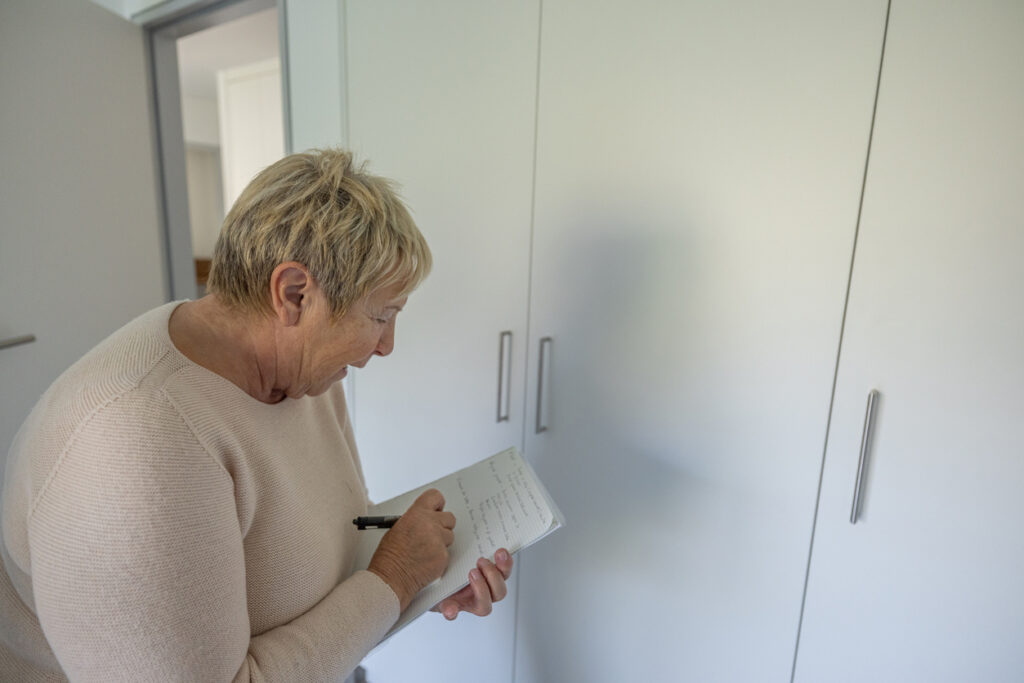Living Well With Dementia

“Most people are “he’s got dementia” that’s it, full stop. I am me. I’m my wife’s husband and my son’s dad.” -Barry, living with dementia
If you’ve had a diagnosis of a dementia causing disease such as Alzheimer’s or vascular dementia it can be frightening and overwhelming. Media routinely uses bleak language about being a “dementia-sufferer”, speak of mourning a loved one who is still alive and if you Google living with dementia you mainly find articles talking about the person with dementia aimed at friends and family rather than articles about helping yourself carry on your life with dementia as part of it. We don’t define people with other chronic conditions this way, you’re never first and foremost a “heart-disease sufferer” or an “asthma sufferer” – you make the necessary adjustments to your life and then you carry on living it. The Service Tree ethos is that dementia is an illness or disability to be lived with, not defined by. Yes you’ll need to adjust, make plans, explain to family and friends, just as you would with other long term conditions.
If you know one person with dementia, you know one person with dementia. No two people are the same and no two people are affected by dementia in the same way. However, as with other long term conditions, there are common issues affecting daily life. Below are some of the ways in which people we have supported living at home with dementia over the years, have adapted and helped themselves after a dementia diagnosis.
With any and all of the tips below, or other adaptations you make, do them early, future-proof. Unfortunately you can’t predict when and how dementia will impact you – but you can prepare so you’re more ready to adapt to the challenges ahead.
A note on the nature of memory, routine and neural pathways
I just want to add a background note about the nature of memory and your neural pathways – I promise it’s more interesting than it sounds and provides some important background to planning and adapting to life with dementia.
Memory impairment is the most common symptom of dementia-causing diseases so it’s a crucial area to think about realistically and plan around. Memory loves routine. Repeating actions time and again lays down stronger neural pathways.
Most of us live on autopilot in daily life, our brains use the memories of times we’ve repeated the same actions or visited the same place and follow the neural pathway of least resistance. A key part of our operating system is memories informing us of how we’ve previously done the things we’re doing now. Memory’s main function is facilitating the things you do everyday. It’s why you might jump in the car and automatically start driving to somewhere you drive to regularly, rather than where you actually want to go! We all live in this autopilot mode a lot in our daily routines and the longer term or more regular the routine the more you will operate on autopilot. Understanding this is helpful when it comes to adapting to life with dementia. The activities you’ve carried out most regularly for longer will continue more easily because of your well-trodden neural pathways.
At Home
- Routine – So memory loves routine. Nowhere will this prove more useful to adapting to life with dementia than in the home. Every task relies on a succession of memories and decisions. Dementia will impact random memories so when making a cup of tea if you have lost the information telling you where you keep the cups, your autopilot response can carry you over that blip as you match with an abundance of old memories completing the same task. When planning and organsing daily life with dementia, routine is one of your greatest friends.
- Your Memory Manual – If it works for you it’s a great idea to write down the steps of your common routines, breaking them down into a step-by-step process, an operating manual to your daily life. This memory manual is beneficial in several ways. The actual process of writing down and thinking about your routines is a great activity for strengthening those neural pathways and giving your brain a work out. It also gives you the opportunity to do a bit of a memory MOT – are there any steps you’ve missed? It’s a good idea to involve a friend as a second pair of eyes as you might not see what you’ve missed. Once you have your manual it’s there to return to again and again.
- Visual Aids – As well as your manual it will become increasingly helpful to have memory aides within your regular line of sight. If you are becoming disoriented at home (this can be a particular problem if you have recently moved) or can’t find items, or forget certain tasks, then signage will help. It might be reminder notes such as to lock the door or visual prompts e.g. as to what is in cupboards Visual perception or language skills can be impacted by dementia (again everyone is affected differently). If this is the case you may want to think about your signs having pictures. I appreciate it can feel a bit weird having signs up in your own home telling you where things are, and even a bit infantilising, but this is about maintaining your independence and facilitating your daily life. If signs helps orientate you or cuts down the time you spend hunting for things then it’s worth it – I would have saved days of my life if I’d established a set place to keep my car key sooner!
- Dementia Clocks – Yes I hate the phrase “dementia clock” too, but if you’re searching for a helpful digital calendar/clock to keep you oriented if your visual perception or timekeeping is affected then this is what you’ll find them sold as most commonly. It is referring to a digital clock that looks like one of those digital photo frames. A clear display tells you the day and time in large clear font in your preferred format. If perception of time becomes a particular problem you can have an orientating format that says e.g. “It is Monday morning” and the time/date.
Out and About
Now is not the time to hide at home. The world may suddenly seen more daunting the other side of a dementia diagnosis, worrying about saying or doing something wrong, what people will think, getting lost, etc but getting out and about more is going to help. Being outside, moving around, joining in, interacting with others, is beneficial to the mental and physical health of all of us young or old, living with dementia or any other condition or none.
- Dementia-Friendly groups The best company and support for a new mum is the other mums in her mother and baby group, the ones who can empathise with the highs and lows, the successes and the messy failures. The same is true when adapting to a health condition including dementia. It is always good to talk through challenges we are facing in any aspect of life with those who understand and can reassure you that its not just you! Seek out dementia-friendly groups in your local area. Here in West Bridgford, Nottingham we have groups hosted by several local churches (contact us for up-to-date information) and around the city The Alzheimer’s Society and others provide regular opportunities for those living with dementia and those that care for or support them to meet up.
The Service Tree have run our dementia-friendly Day Social every Tuesday in West Bridgford for over 10 years. This is a day for anyone living with dementia to come along and enjoy good food, good company and professional entertainment with any care and support needed on hand. Contact us if you’d like a free visit any Tuesday to see if our Day Socials suit you.
- Driving A diagnosis of a dementia does not mean you’re automatically disqualified from driving. People can live with dementia, especially e.g. Alzheimer’s disease, for years before it impacts skills such as driving. You do however have to inform the DVLA and your insurers straight away. Your doctor (usually your GP) will reassess you ability to drive safely annually.
- Get help getting out As dementia progresses it eventually will impact your ability to get out and about and enjoy the things you used to on your own. This doesn’t mean you have to stop, it just means you need to adjust. Either get out with a friend or family member or a home care support worker. Accessing your community, continuing to enjoy the things that make life fun, are vital to mental and physical health. Most of us need help in life at some point and there’s no point wasting time being proud about it when you could be out having fun.
With Other People
Talk to the people in your life. Whatever you do don’t try to hide or ignore your diagnosis – it won’t be ignored. At the earliest opportunity start talking to your family and friends about your illness and the ways in which it is affecting you. Be really open – even if this puts you outside of your comfort zone, it will be worth it. To ensure that you have the best possible quality of life the way you want it, you will eventually need help. Who are the people that you are going to need on your team? Don’t put this off, be prepared and make sure those travelling alongside you are prepared too.
- Keep in Touch a dementia diagnosis can be daunting and might feel isolating. Don’t hide yourself away, strengthen your relationships, keep in touch more, establish regular coffee dates, phone calls, cinema trips etc. Make social routines. Normal levels of social interaction that keep those brain cells firing is strongly linked with slowing down the progression of dementia symptoms.
- Ask Questions If you missed something, don’t understand or have forgotten don’t be afraid to ask in whatever style you’re comfortable with, it is always ok to say “sorry what did you say I’m having a senior moment” or “didn’t get a word of that – don’t worry it’s just the dementia”. As with all open, honest conversations about physical or mental illness, the more you open up, talk and normalise your experience, the more you add to our community becoming a bit more dementia-friendly.
- Keep Notes Write down important details that you might forget – if you’re anything like me you’ve probably been doing this for years.
- Emergency information There may come a day when dementia catches you out and you just can’t remember your address or visualise your way home, Again future-proof yourself. Carry a card with basic emergency information and who to contact in the event of an emergency.
These are just a few of the many ways you can adjust to your dementia diagnosis to help you carry on living life the way you want to for as long as possible. If you would like to know more the Alzheimer’s Society and Age UK websites are two of the most useful. Both have a comprehensive range of information resources. If you’d prefer to talk on the phone or face-to-face about your personal circumstances we are always happy to help. The Service Tree offer specialist dementia home care and day care services in West Bridgford and the surrounding area. However, we are always happy to signpost and just offer some advice with no obligation or sales pitch. We are also Alzheimer’s Society Dementia Friend’s Champions and are happy to give a Dementia Friends dementia awareness session to local community groups.
For more information get in touch with Lucy or Jo on 0115 945 5639.





